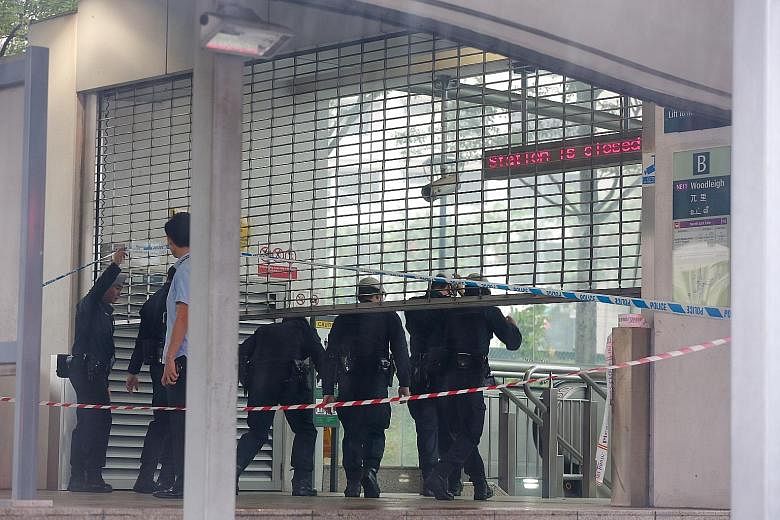First, a bag. Then baking flour.
Within three short weeks, Singapore was hit by two "security incidents", at Hougang and Woodleigh MRT stations.
And Singaporeans can expect more to come, said security experts, calling such terror scares "the new normal" in a time of heightened security.
They were weighing in, as people debate whether the authorities were overly paranoid in reacting to the Hougang and Woodleigh incidents.
The two stations were closed - for 20 minutes and three hours respectively - while police officers swooped in and commuters found themselves having to divert their routes.
-
Incidents around the world
-
UNITED STATES
A man sprinkling white powder at the 9/11 Memorial in New York city on Tuesday evening caused a 30-minute shutdown of the museum as the authorities investigated the suspicious powder. The substance was later determined to be salt, according to police.
MALAYSIA
A suspicious package discovered on Monday near the National Library and Wisma Bernama in Kuala Lumpur prompted the authorities to cordon off the area for over two hours.
A police bomb disposal unit set off a small explosion to destroy the package, which turned out to be a cloth-covered bottle filled with cooking oil.
THAILAND
The alarm was raised when two phones in a clear plastic container and connected by cable to a power bank were found abandoned at Bangkok's Suvarnabhumi Airport in June last year.
Roads were closed and bomb disposal experts and sniffer dogs pored over the package and area for about half an hour.
Airport security officials later said the phones were believed to have been left by an Uber driver trying to evade the authorities as such services are illegal in the country.
Train operator SBS Transit was unable to say how many commuters were affected. But an estimate puts them in the thousands.
In the end, the items were found to be innocuous: a bag containing only household items left unattended while the owner ran an errand; and smidges of flour left on the ground by a runners' group to mark their trail.
That the Woodleigh incident last Tuesday came hard on the heels of the Hougang one on April 2 inevitably raised questions as to whether the authorities overreacted.
Mr Tan Cheng San, 77, a musician who frequents Woodleigh MRT station, said: "I wasn't around (during the incident), but it looked like they were making a mountain out of a molehill. Nobody got hurt."
But security experts said Singaporeans should take it in their stride - and in fact, be prepared for more of such incidents to come.
"It's the new normal," said S. Rajaratnam School of International Studies senior fellow Yang Razali Kassim. "The recent scares are as close as we can get to the real thing.
"They are not drills or exercises, but real-life scares - except there were no lives lost, injuries or damage to property."
Singapore has been "lucky" to have avoided a real threat so far, said Associate Professor Andrew Tan from Macquarie University's Department of Security Studies and Criminology. He said the authorities' decision in both cases to evacuate and close stations was "absolutely warranted".
Similarly, MP Vikram Nair said inconveniences caused by security threats will become a way of life. "Of course people are annoyed... but better the authorities take precautions and ensure it's a false alarm. I would be worried if they didn't react," said the chairman of the Government Parliamentary Committee for Defence and Foreign Affairs.
Explaining the authorities' actions, Parlimentary Secretary for Home Affairs Amrin Amin told The Sunday Times: "When making operational decisions, our top-most priority is to ensure the public's safety and security. Our decisions may inconvenience the public, but that is inevitable."
He added: "My sense is that the majority of Singaporeans understood that we needed to do this."
Both instances saw the authorities and SBS Transit utilise social media to alert the public about the station closures, alternative routes and the activation of free buses.
Nanyang Technological University Centre of Excellence for National Security senior analyst Juhi Ahuja said the power of social media to keep people updated is underscored. "With social media and the SG Secure app, anyone with a smartphone and data can be meaningfully involved in their own safety. They can also provide feedback so others avoid the area," she said.
Just as key: the message to would-be terrorists, said Prof Tan.
The prompt steps taken highlight Singapore's resilience, he said, adding: "This sends a message to potential terrorists that what they might be planning would be futile as the impact would not be great. It also gives confidence to the public that life can go on seamlessly despite terrorism threats and fears."
Madam Kamala Veni, 37, a housewife whose Primary 3 daughter had to take a different route home from school during the Woodleigh MRT closure, said she felt the situation, while thankfully a scare, was handled well. "I kept checking for updates and my daughter managed to take a bus home instead of the train," she said.
"It might be an inconvenience, but it gives me confidence in the case of a real emergency."
SEE INSIGHT


